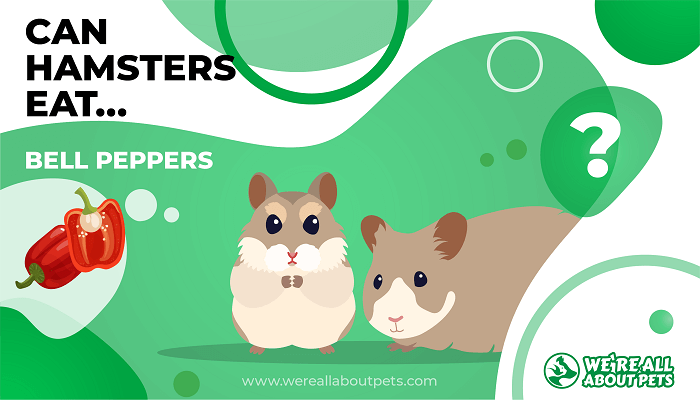Yes, hamsters can safely eat bell peppers. They are a healthy and nutritious treat for them.
Hamsters are adorable little creatures that bring joy and laughter to our lives. As pet owners, it is our responsibility to ensure their well-being by providing a balanced and appropriate diet. One question that often arises is whether hamsters can eat bell peppers.
Well, the answer is a resounding yes! Bell peppers can be a delicious and healthy addition to your hamster’s diet. These vibrant and crunchy vegetables are rich in vitamins A and C, which are essential for your pet’s overall health. However, it’s important to know how to properly introduce and serve bell peppers to your furry friend, as a sudden change in diet can cause digestive issues.

Credit: petkeen.com
Benefits Of Bell Pepper For Hamsters
Bell peppers can be a healthy snack for hamsters, providing essential nutrients such as vitamin C and fiber. The crunchy texture also helps to keep their teeth trim and healthy. However, it’s important to introduce them gradually into a hamster’s diet to avoid digestive issues.
| Benefits of Bell Pepper for Hamsters |
|---|
| High Nutritional Value |
| Bell peppers are rich in Vitamin C, essential for hamsters’ immune system. |
| They also provide fiber which aids in digestion and prevents digestive issues. |

Credit: wereallaboutpets.com
Related Article: What is the Difference between Dog Hair And Dog Fur
Risks Of Feeding Bell Pepper To Hamsters
Feeding bell pepper to hamsters may pose risks to their digestive system due to the potential for digestive upset if consumed in excessive amounts.
Furthermore, some hamsters may exhibit allergic reactions to bell pepper, which could lead to health issues if not monitored carefully.
Additionally, bell peppers have high sugar content, which can cause unwanted weight gain and other health problems for hamsters if not given in moderation.
Preparing Bell Pepper For Hamsters
Bell peppers can be a safe and healthy addition to a hamster’s diet. They are packed with nutrients and make a great snack option for your furry friend. Be sure to wash the pepper thoroughly, remove the seeds and cut it into small, manageable pieces before feeding it to your hamster.
| Washing and Cleaning: Rinse bell peppers thoroughly under running water. |
| Removing Seeds and Core: Slice the bell pepper and remove seeds and core. |
| Cutting into Safe Sizes: Cut the bell pepper into small, safe pieces for hamsters. |
Introducing Bell Pepper To Hamsters
Introducing bell pepper to hamsters can be a nutritious addition to their diet. Start by offering small amounts of bell pepper, as sudden changes in their diet may cause upset stomachs. Observe your hamster closely for any negative reactions such as diarrhea or loss of appetite. If your hamster shows any signs of discomfort, remove the bell pepper from their diet immediately.
Once your hamster has adjusted to small amounts of bell pepper without any negative reactions, you can gradually increase the quantity. Bell peppers are a great source of vitamin C and fiber which can benefit your hamster’s overall health. However, keep in mind that bell pepper should be given as a treat and not as a staple food.
Other Safe Vegetables For Hamsters
Hamsters can enjoy carrots as a crunchy treat in moderation. You should wash them thoroughly to remove any pesticides. Cucumbers are another safe option for hamsters to munch on. Make sure to remove the seeds as they can be a choking hazard. Broccoli can be fed to hamsters as well, but in small amounts due to its high water content. Always introduce new vegetables slowly to prevent digestive upset. It’s important to remember that variety is key when it comes to feeding your hamster. Offering a range of safe vegetables can help ensure they receive a balanced diet and enjoy their meals. Remember to consult a veterinarian for guidance on your hamster’s specific dietary needs.
Forbidden Foods For Hamsters
Hamsters should avoid onions and garlic as they can cause digestive issues and can be toxic to them. Similarly, chocolates and sweets are harmful to hamsters as they contain high levels of sugar and can cause obesity and diabetes. Additionally, avocado contains a substance called persin which is toxic to hamsters and should be avoided from their diet.
Healthy Diet For Hamsters
Hamsters can indeed eat bell pepper as part of a healthy diet. Balancing vegetables and pellets is essential for ensuring that your hamster gets a well-rounded diet. Bell peppers are a rich source of vitamin C, which is important for the overall health of your hamster. However, it’s crucial to note that bell peppers should be fed in moderation as part of a varied diet. Along with vegetables, pellets are a key component of a hamster’s diet as they provide essential nutrients. Moreover, fresh water should always be available to your hamster to keep them hydrated. Lastly, it’s important to limit treats and sugary foods, as they can lead to health problems and weight gain. By following these guidelines, you can ensure that your hamster has a nutritious and balanced diet.
Credit: medium.com
Consulting A Veterinarian For Diet
Consult a veterinarian: Before introducing bell peppers to your hamster’s diet, seek professional advice.
Customizing diet: Every hamster is unique, so individual adjustments to their diet may be necessary.
Recognizing issues: Watch for any signs of digestive problems or other dietary issues in your hamster.
Conclusion
Incorporating bell peppers into your hamster’s diet can provide essential nutrients. Remember moderation is key! Your furry friend will benefit from the vitamins and minerals. Always consult with a vet before introducing new foods. Keep your hamster healthy and happy with a balanced diet.





